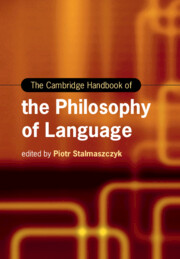Book contents
- The Cambridge Handbook of the Philosophy of Language
- Cambridge Handbooks in Language and Linguistics
- The Cambridge Handbook of the Philosophy of Language
- Copyright page
- Contents
- Figures
- Tables
- Contributors
- Preface
- 1 Philosophy of Language: Definitions, Disciplines, and Approaches
- Part I The Past, Present, and Future of Philosophy of Language
- Part II Some Foundational Issues
- Part III From Truth to Vagueness
- Part IV Issues in Semantics and Pragmatics
- Part V Philosophical Implications and Linguistic Theories
- Part VI Some Extensions
- 31 The Philosophy of Argument
- 32 Negation and Denial
- 33 Deception: Lying and Beyond
- 34 Types and Definitions of Irony
- 35 Philosophy of Language and Metaphor
- 36 Analytic Philosophy of Literature
- 37 The Many Facets of Linguistic Relativity
- References
- Index
31 - The Philosophy of Argument
from Part VI - Some Extensions
Published online by Cambridge University Press: 12 November 2021
- The Cambridge Handbook of the Philosophy of Language
- Cambridge Handbooks in Language and Linguistics
- The Cambridge Handbook of the Philosophy of Language
- Copyright page
- Contents
- Figures
- Tables
- Contributors
- Preface
- 1 Philosophy of Language: Definitions, Disciplines, and Approaches
- Part I The Past, Present, and Future of Philosophy of Language
- Part II Some Foundational Issues
- Part III From Truth to Vagueness
- Part IV Issues in Semantics and Pragmatics
- Part V Philosophical Implications and Linguistic Theories
- Part VI Some Extensions
- 31 The Philosophy of Argument
- 32 Negation and Denial
- 33 Deception: Lying and Beyond
- 34 Types and Definitions of Irony
- 35 Philosophy of Language and Metaphor
- 36 Analytic Philosophy of Literature
- 37 The Many Facets of Linguistic Relativity
- References
- Index
Summary
This chapter provides an overview of the philosophy of argument. It describes the conceptual and systematic aspects of logic, dialectic, and rhetoric, and illustrates how the insights developed within these classical disciplines are reflected in approaches within the present-day field of argumentation theory. The overview starts, in Section 31.2, with a general introduction into the philosophy of argument, elucidating its research questions and the characteristics of the main perspectives from which these questions are answered. Then, in Section 31.3, how philosophers of argument conceptualize argumentative discourse at large is discussed. The section first focuses on dialectical taxonomies of dialogue types and communicative practices in which argumentation plays a central role. Subsequently, it presents the classical rhetorical theory of genres of speech.
- Type
- Chapter
- Information
- The Cambridge Handbook of the Philosophy of Language , pp. 571 - 589Publisher: Cambridge University PressPrint publication year: 2021
- 1
- Cited by


